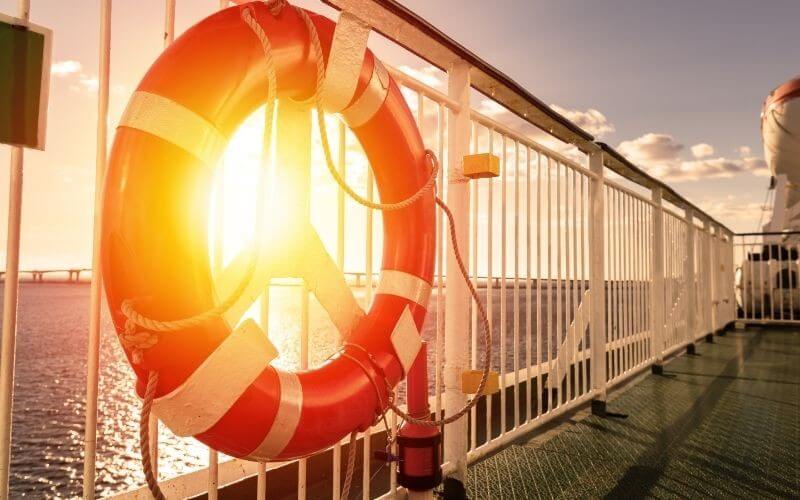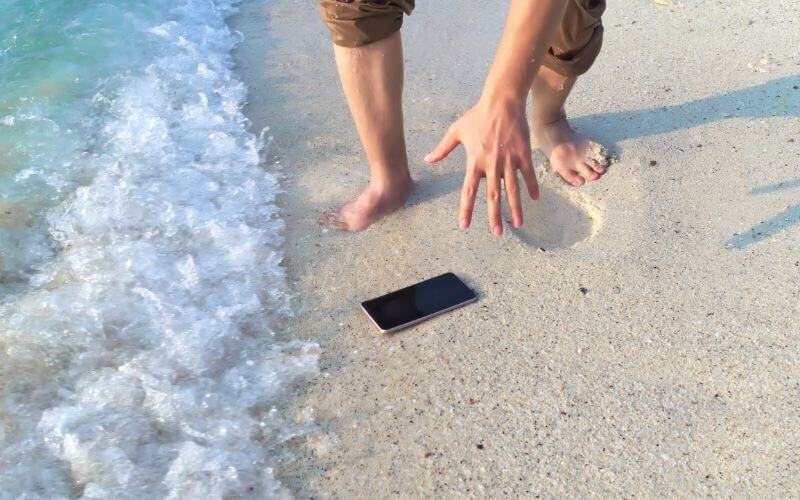When planning a cruise, it’s wise to make sure that you’re covered financially should you fall ill, miss your flight, lose your luggage or your cruise be cancelled.
But do you need special cruise travel insurance? Or will your usual annual travel insurance policy do the job?
This guide to cruise travel insurance explains exactly what you need and when.

Never cruise uninsured!
Travel insurance for a cruise is strongly recommended. A standard travel insurance policy that also covers cruises is sufficient, but for extra protection you can get specialist cruise cover that includes things like missed port of call or confinement to your cabin.
Travel insurance is not a legal requirement for any kind of travel. However, it’s always wise to get it, because unforeseen costs due to medical emergencies, cancellation and lost luggage while travelling can be very high.
If you’re taking a cruise, then medical bills can be even higher than usual, particularly if you need to be taken ashore for medical treatment. One British grandmother was hit with a bill for £50,000 after she was airlifted to hospital from a cruise ship in Mexico.

Not all insurance is equal…
There are three kinds of travel insurance:
- Travel insurance with no cruise cover – Standard travel insurance that excludes cruises
- Travel insurance with cruise cover – Standard travel insurance that covers you for things like medical treatment and lost luggage, including during your cruise
- Cruise travel insurance – Specific cover for cruises. As well as the standard cover for medical bills etc, this may include extra cover for cruise-specific things like missed ports or confinement to your cabin
If you’re taking a cruise, you’ll need to get a policy that falls into one of the second two categories.
My Recommendation
My recommendation for cruise insurance depends on where you live.
- If you live the UK: Compare Your Cruise
- If you live the USA: InsureMyTrip
These are trusted price comparison sites that will quickly get you lots of quotes to match your exact needs.
Policies that describe themselves as ‘cruise travel insurance’ could fall into either of those last two categories, so it’s important to understand exactly what you’re getting.
Whilst specialist cruise travel insurance is good to have as it covers you for more things, it’s not completely necessary – standard travel insurance that includes cruise cover may be enough for what you need.

What Does Cruise Travel Insurance Cover?
If you take out extra cruise cover, you’ll be insured for things that could only happen on a cruise, that someone taking a land holiday wouldn’t need.
Things covered by specialist cruise cover:
- Confinement to cabin for medical reasons
- Missing a port due to bad weather
- Rejoining your cruise ship after an illness
Things covered by standard travel insurance:
- Medical expenses
- Lost or stolen luggage
- Holiday cancellation
Most cruise travel insurance policies exclude extreme sports and activities like skydiving or bungee jumping, so if you plan on doing anything like this during your holiday, you may need to take out extra cover.
Some cruise ships offer rock climbing, zip-lining, indoor skydiving, trapeze classes and trampolining on the ship. These will likely be covered by your travel insurance, but it’s worth reading the small print to check.

What is Cruise Cover Insurance?
Cruise cover insurance can mean a general travel insurance policy that includes (or doesn’t exclude) cruises, or it can mean specialist cruise cover for specific things that could only happen during a cruise.
Cruise travel insurance can be a standalone travel insurance policy, or it can be a specialist cruise cover that you add on to your existing travel insurance policy.
You can buy cruise cover for a single cruise, or as an annual policy that covers all your travel during a 12-month period.
What is the Best Cruise Insurance?
The best travel insurance for cruises is a policy that includes cruise-specific features such as confinement to your cabin and missed ports.
However, this could cost more than standard travel insurance that includes cruises.
To work out which type of cruise insurance cover is the best value, think about:
- The price of the policy
- How much you are covered for for cruise-specific problems
- The chance of a cruise-specific problem
- How much the excess is
For example
Let’s say it costs £20 extra to be covered for missing a port of call.
Let’s say the payout for a missed port is £50.
The chance of a port being cancelled depends on the itinerary.
The excess is £60.
In this scenario, the cover is cheap and the payout for a missed port is decent. However, the excess is higher than the payout.
So it would only be worth it if you missed two or more ports. Missing one port happens from time to time, but missing two is very unlikely, so it wouldn’t be worth it.
However, if the same insurance policy also paid out £100 for each day that you are confined to your cabin, then that could be worth it in case of illness.
My Recommendation
My recommendation for cruise insurance depends on where you live.
- If you live the UK: Compare Your Cruise
- If you live the USA: InsureMyTrip
These are trusted price comparison sites that will quickly get you lots of quotes to match your exact needs.
Cruise insurance is more expensive than regular travel insurance
Travel insurance that includes cruise travel can be more expensive than travel insurance that doesn’t include cruise travel because the medical expenses if you’re taken ill at sea are usually higher.
If you have a heart attack in a hotel, you’ll be taken to the hospital in an ambulance. If this happens at sea, you may need a helicopter.

In addition, specialist cruise insurance is generally more expensive than general travel insurance that includes cruises because more is covered. You can claim for things like missing a port of call that could only happen on a cruise.
If you want cheap cruise insurance, look for a policy that doesn’t include cover for all the extras. The main things you’ll need to be covered for are your medical bills and your possessions.
How Much is Cruise Insurance?
The price of cruise insurance varies depending on:
- The destinations
- The length of the cruise
- Your age
- Your pre-existing medical conditions
The cheapest cruise insurance policies could cost as little as £9 for a single trip.
Those who are over 80 or have certain pre-existing medical conditions could find that cruise cover is much more expensive. In some cases, the price of insurance could cost more than the cruise. It’s always worth spending some time shopping around for the best price.
If you struggle to get affordable cover because of your age or medical history, then you might then want to look for specialist providers.

Annual Travel Insurance Including Cruise Cover
Even if you only plan to cruise once in a year, it could be worth taking out an annual cruise travel insurance policy. This will cover you for other kinds of travel including air travel abroad and UK hotel stays.
If you’re not sure, get a quote for a single trip and an annual multi-trip policy and compare the prices. You may be surprised to find that an annual policy doesn’t cost much more.
How to Add Cruise Cover to Holiday Insurance
If you already have an annual travel insurance policy and you want to book a cruise, the first thing to do is to check what is covered by your existing annual policy. If it doesn’t cover cruise travel, you should contact your travel insurance provider and ask if they can add on cruise cover.
It’s usually cheaper to add cruise cover to an existing travel insurance policy. If for any reason you cannot do this, then you could take out a single trip cruise insurance policy to cover your cruise.
Is Cruise Insurance Worth It?
Cruise insurance is definitely worth getting, because while you are unlikely to use it, the money it will save you if you do need to will be extremely valuable. Medical costs alone can be very high.
I understand that buying travel insurance cruise cover is another expense, and you might be on a budget for your cruise. But you’ll regret it even more if you don’t take out a policy and something goes wrong.
Don’t try to save money by refusing to get a policy. Instead, shop around for cheap cruise travel insurance so that you only pay what you need to, for the cover that you require.
My Recommendation
My recommendation for cruise insurance depends on where you live.
- If you live the UK: Compare Your Cruise
- If you live the USA: InsureMyTrip
These are trusted price comparison sites that will quickly get you lots of quotes to match your exact needs.
Conclusion
It’s strongly recommended that you take out travel insurance when you book a cruise. You’ll need to make sure that your policy includes cruise cover, as not all of them do.
In addition to your standard cruise holiday insurance policy, you can purchase additional cruise cover for things like missed ports of call or confinement to your cabin.
Whether you decide to go for the standard or specialist cruise cover, or to buy a single or annual policy, the most important thing is that you read the details carefully to make sure that you’re covered for everything you need.
Related posts:
- How Much Does A Cruise Cost?
- Cruising While Pregnant: Everything You Need to Know
- What Happens If You Jump Off A Cruise Ship?

Jenni Fielding is the founder of Cruise Mummy. She has worked in the cruise industry since 2015 and has taken over 30 cruises. Now, she helps over 1 million people per month to plan their perfect cruise holidays.



Hi Jenni,
I enjoy reading your post, and even though my wife and I are seasoned cruisers, I still learn things that I didn’t know before. Thank you for explaining pineapples, I had always wondered.
The next time you post anything showing what it costs in pounds/euros, could you please list it in US currency as well? I have no idea what the conversion is and don’t have the time to keep looking it up.
Thanks,
Gary
I was able to infer that your reference to ‘excess’ is what we in the US call ‘deductible.’